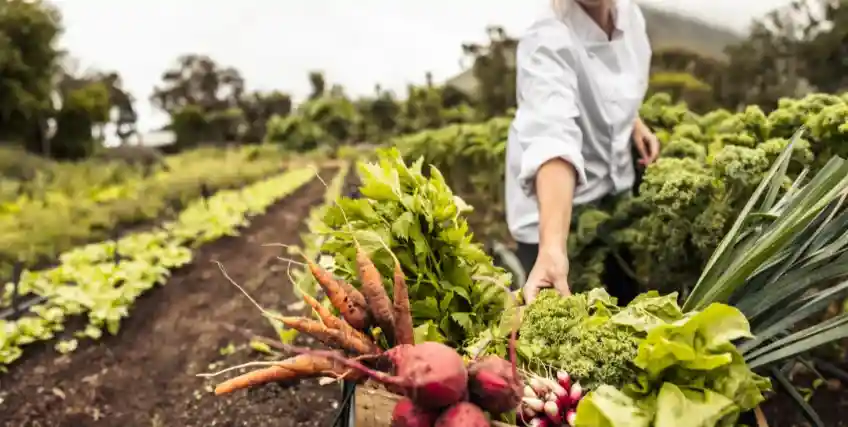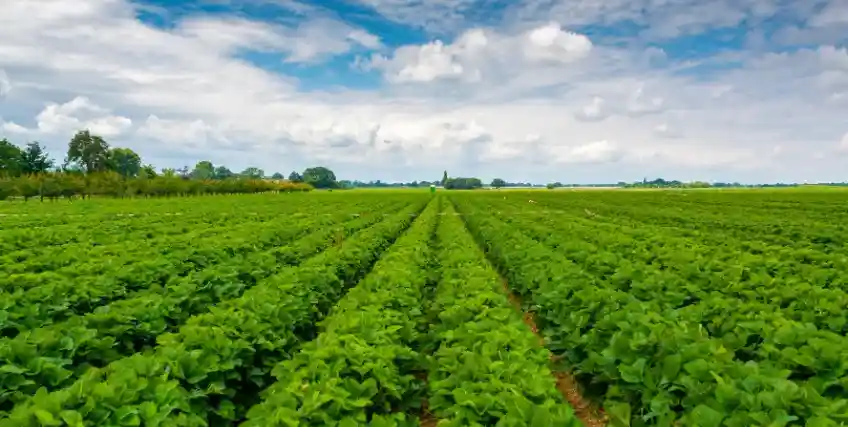Financing Your Organic Farm: Loans, Grants, and Tips for Farmers
Oct 14, 2025 | Last Updated on: Oct 15, 2025

Organic farming can be a rewarding pursuit if you're committed to sustainable agriculture, but it often comes with major financial hurdles. Whether you're already established or thinking of transitioning to organic, financing for organic farming is almost always essential to keep your operations running smoothly. From purchasing certified organic seeds and equipment to navigating the three-year transition period to organic certification, numerous financial stresses are put on your business.
That said, there's a robust ecosystem of financial support out there, including specialized organic farm loans and targeted grants, to help producers build financially sustainable operations. Here, we explore funding for organic farming, from organic farm loans to specific government grant programs.
In this article:
- Understanding the cost demands of rural development and organic farming.
- Exploring organic farm loans and other financial assistance available to borrowers.
- Learning what you can do to increase your chances of getting approved for financing.
Financing Challenges for Organic Farmers
The agricultural industry is, by nature, cyclical. Landowners must constantly till the land, harvest, and rotate crops to keep farmland arable and healthy. Some seasons may not yield anything at all. Crops are always at risk from natural disasters, failure due to soil health, pests, and even changing public policy in the form of farm bills in Congress.
Lenders often view organic farming as particularly risky, especially during the transition phase. In addition to yield volatility and the necessary risk management for lenders, farms that are transitioning to organic farming don't have a reliable crop history. This can make it particularly difficult to qualify for organic farm loans through traditional means. That's where specialized programs and lenders that understand the value proposition of organic agriculture become invaluable.
Many farmers leverage a combination of loans and grants for organic farmers to get the financing they need.
Types of Organic Farm Loans
Organic farm loans can be a great source of capital, especially for established farmers looking to purchase land or equipment, or to cover operating expenses. The most significant lender in this space is the U.S. Department of Agriculture's (USDA) Farm Service Agency (FSA), which offers direct and guaranteed loan programs tailored for farmers who cannot obtain commercial credit.
FSA Loans
The FSA offers Direct Farm Ownership Loans and Guaranteed loans to farmers. Either may be useful as organic farm loans.
Direct Farm Ownership Loans can be used to buy farmland, construct or improve buildings, and implement approved conservation practices. They can also cover operating expenses like livestock, feed, seed, fuel, and equipment. The FSA targets a portion of its funding specifically toward beginning farmers and ranchers, which often overlaps with new organic producers. To qualify for these organic farm loans, you'll typically need to be a U.S. citizen with an acceptable credit history and sufficient education or experience in farm management.
FSA guaranteed loans are offered through approved commercial lenders, but the government partially guarantees the loan.
FSA Microloans
The FSA also offers a Microloan program with a more streamlined approval process for a maximum of $50,000. These flexible loans can be used for farm operating or ownership costs, such as organic seeds, small equipment, crop insurance, and other startup necessities. They're more accessible for new farmers due to less strict eligibility requirements, and can be a great step towards larger organic farm loans later on.
Farm Storage Facility Loans (FSFL)
For organic operations focused on high-value specialty crops, proper storage is vital for market access and price stability. The FSFL program provides low-interest financing for building or upgrading facilities to store, handle, and transport eligible commodities, including cold storage and refrigerated units. This specialized financing for organic farming can help farmers store their products until market conditions are more favorable.
Conservation Loans
The FSA Conservation Loan (CL) Program can be used to implement approved conservation measures that directly support long-term organic farming practices. These organic farm loans are typically offered as guaranteed loans offered through commercial loans.
Private Lenders
Finally, beyond government options, some private financial institutions, including certain Farm Credit System institutions and mission-driven lenders, offer specialized organic farm loans and flexible financing for transitioning farms. These lenders can often offer more tailored, flexible terms since they understand the realities of organic farming.
Likewise, traditional and online lenders both may offer agricultural loan programs and organic farm loans that are worth exploring.
Grants and Cost-Share Programs
In addition to organic farm loans, grants and cost-share programs may offer useful funding for organic farming. These are non-repayable forms of funding, making them particularly desirable for organic producers. These programs typically focus on specific activities, such as certification, conservation, marketing, and research.
Organic Certification Cost Share Programs (OCCSP)
One of the most direct forms of financial support is the USDA's Organic Certification Cost Share Program. Administered through state departments of agriculture, this program reimburses certified organic producers for a significant portion of their annual certification fees. The dollar amount is capped, and it's not exactly “new” money since it's a reimbursement, but it can provide consistent, direct relief from mandatory overhead costs.
Environmental Quality Incentives Program (EQIP) Organic Initiative
The Natural Resources Conservation Service (NRCS) administers EQIP, which provides financial and technical assistance for implementing conservation practices. The EQIP Organic Initiative is specifically geared towards certified organic producers and farmers transitioning to organic. This government program provides funding for organic-aligned practices like cover cropping, nutrient management , conservation tillage, and the establishment of pollinator habitat. While you could fund these initiatives with an organic farm loan, a grant doesn't have to be repaid.
That said, EQIP funding is highly competitive, but worth exploring if you want to make conservation-related improvements.
Conservation Stewardship Program (CSP)
The Conservation Stewardship Program (CSP) is for producers who are already implementing a high level of conservation on their land. It provides annual payments for maintaining and improving existing conservation systems and adopting new conservation activities.
Sustainable Agriculture Research and Education (SARE) Grants
Sustainable Agriculture Research and Education (SARE) is an organization that aims to foster advancements in sustainable agriculture. They offer several grants for organic farmers who want to test new production methods, conduct market research for a specialty organic crop, or develop innovative new tools. Again, these grants are highly competitive, but are well worth the time investment if they can save you the long-term costs of organic farm loans.
Value-Added Producer Grants (VAPG)
The Value-Added Producer Grants (VAPG) program helps producers develop businesses that process and market value-added agricultural products. These are products created from the original raw materials, like cheese from organic milk, or pickles from organic cucumbers. VAPG grants can be used for business planning and working capital, making them a great resource for organic farmers looking to diversify or move up the supply chain.
Practical Tips for Securing Organic Farm Funding
Securing organic farm loans or grants requires preparation and dedication. Here are some tips to help organic farmers succeed:
- Develop a comprehensive business plan: Whether you're applying for organic farm loans or grants, your business plan is essential. It should clearly articulate your market niche, your operational plan, and your financial projections, especially if you have to go through the three-year transition period to organic.
- Keep impeccable financial records: Lenders and grant evaluators need to see detailed, organized records. This includes tax returns, income statements, balance sheets, and cash flow Accurate record-keeping shows good management skills and an ability to repay an organic farm loan.
- Show your experience: For any loan or grant application, you'll need to demonstrate sufficient farm management experience. Whether it's on-farm experience, collegiate education in agriculture, farm mentorship or apprenticeship programs, or even significant business management experience, all of it is relevant to your application.
- Start small: If you're a new farmer or have a limited credit history, start with an FSA Microloan or another small organic farm loan. Successfully managing and repaying a smaller loan will help build your credit and establish a relationship with a lender for future, larger capital needs.
- Research private and state-level funding: In addition to national programs, many states and private financial institutions offer specific grants and low-interest organic farm loans. Take the time to fully research state-level agricultural development funds and local food system grants in addition to federal programs.
Final Thoughts
Financing an organic farm is a journey that requires patience, diligence, and a strategic approach. By combining organic farm loans, grants, and specialty lenders' support, you can build a strong financing foundation to support your transition to or scaling of an organic farm. Always keep meticulous records and maintain a proactive relationship with agricultural financing experts. There are many resources available to help organic farmers grow their visions, you just have to take advantage.
FAQs About Organic Farm Loans
1. What is the Organic Certification Cost Share Program, and how does it help organic farmers?
The Organic Certification Cost Share Program (OCCSP) is a program administered by the USDA's Agricultural Marketing Service (AMS). It provides financial assistance to organic producers by reimbursing them for a portion of their annual certification fees. It helps offset the overhead cost of maintaining organic certification.
2. What is the main difference between an FSA Direct Farm Loan and a Guaranteed Farm Loan?
An FSA Direct Loan is funded and serviced directly by the USDA's Farm Service Agency. A guaranteed loan is funded and serviced by a commercial lender while the FSA guarantees a portion of the loan against potential losses. This guarantee encourages commercial lenders to approve organic farm loans to farmers who might not otherwise qualify.
3. Can a farm that is transitioning to organic, but not yet certified, get financing?
Programs like the Environmental Quality Incentives Program (EQIP) have an Organic Initiative specifically designed to assist producers during the three-year transition period. This program provides financial and technical assistance to help farmers implement the required conservation practices to meet organic standards.
4. What documents are most necessary when applying for an organic farm loan?
The most critical documents are a comprehensive business plan, current and projected financial statements, and tax returns. A clear demonstration of management experience is also essential.
5. Are there specialized private organizations that offer organic farm loans?
Beyond federal programs, certain private entities, such as mission-driven lenders, Community Development Financial Institutions (CDFIs), and organizations like Iroquois Valley Farms and Mad Capital, offer flexible organic farm loans and financing options tailored to the unique needs of organic and sustainable agriculture.
Frequent searches leading to this page
Term Loans are made by Itria Ventures LLC or Cross River Bank, Member FDIC. This is not a deposit product. California residents: Itria Ventures LLC is licensed by the Department of Financial Protection and Innovation. Loans are made or arranged pursuant to California Financing Law License # 60DBO-35839




